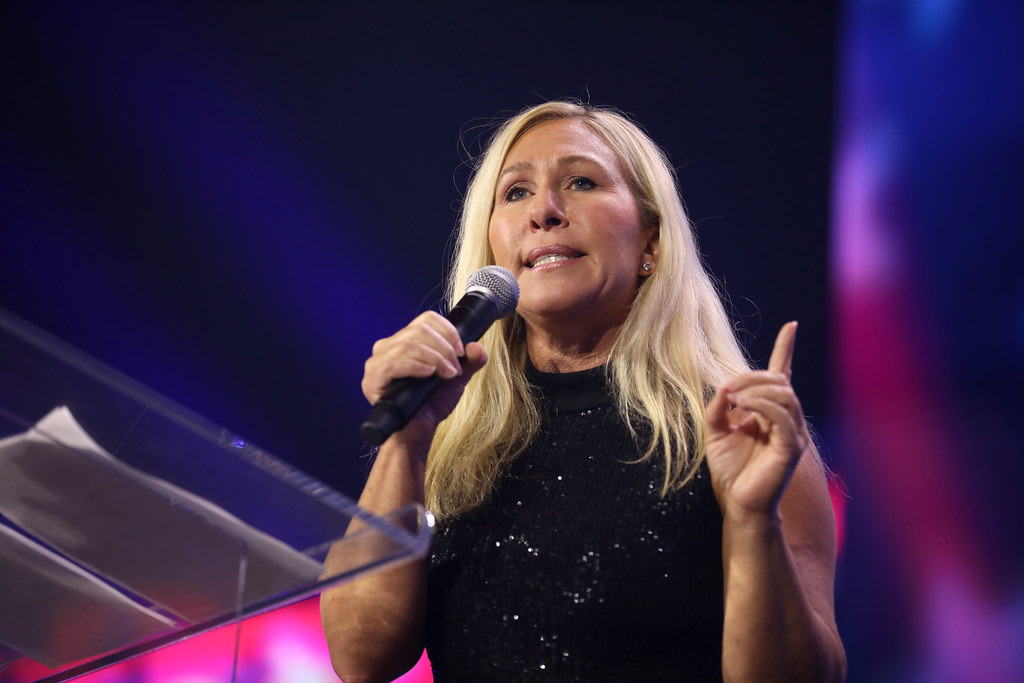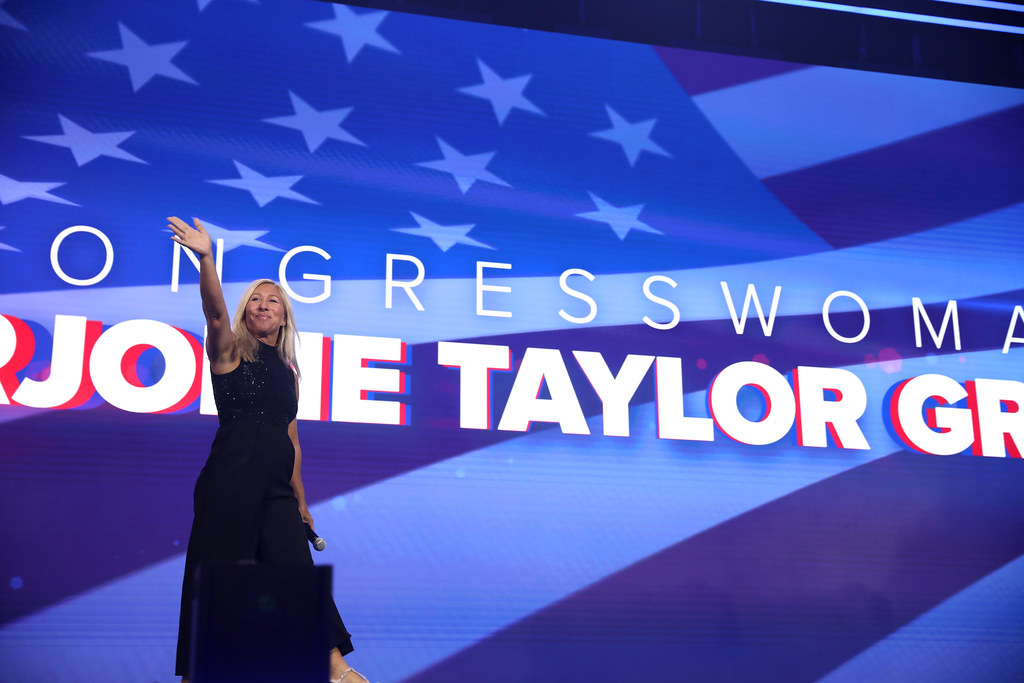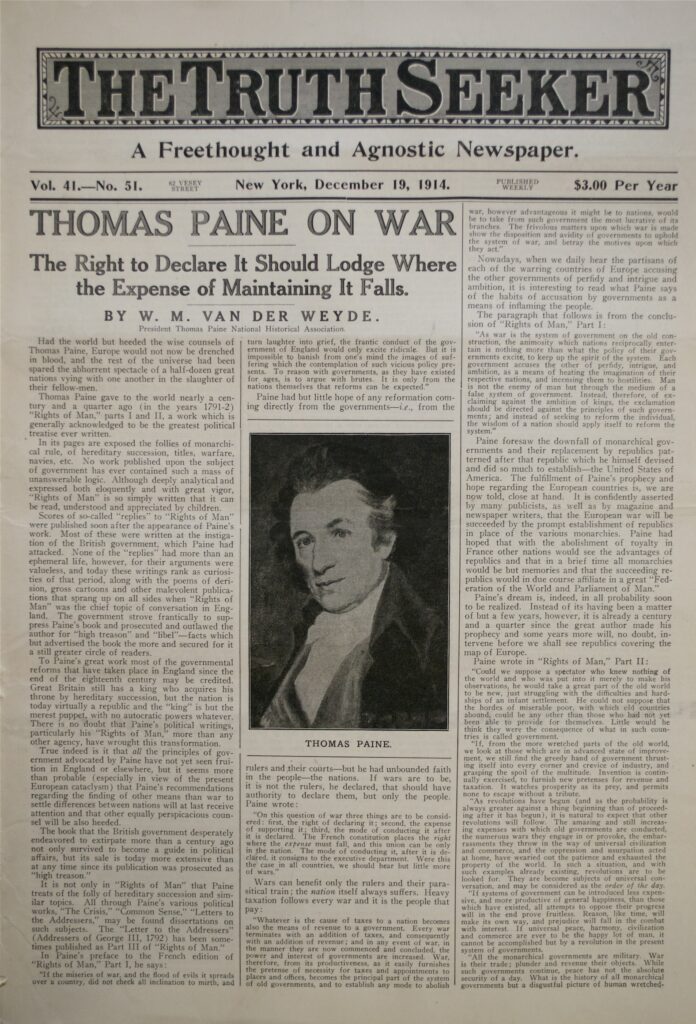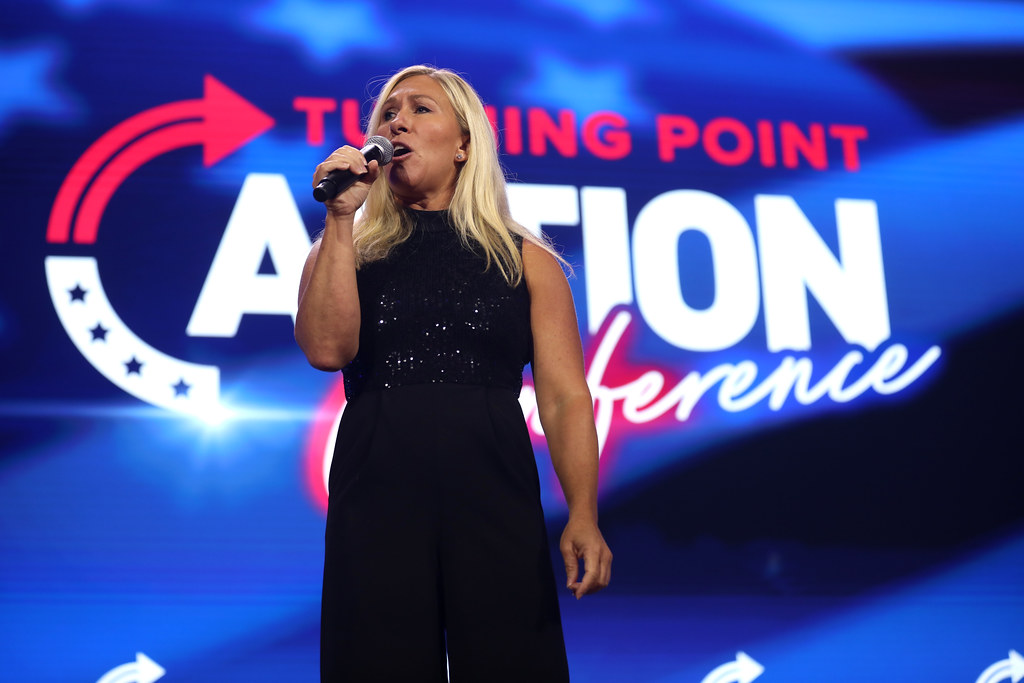
Marjorie Taylor Greene, the Republican representative for Georgia’s 14th congressional district, has rapidly become one of the most recognizable and often polarizing figures in the landscape of contemporary American politics. Since her election in November 2020, her tenure in the U.S. House of Representatives has been consistently marked by a fervent embrace of controversial positions, a distinctive communication style, and a pronounced willingness to challenge established norms. This approach has garnered her both unwavering support from a dedicated base and significant criticism from a broad spectrum of observers.
Her public persona is largely defined by an ardent advocacy for former President Donald Trump and an outspoken, often combative, approach to policy debates. These characteristics frequently place her at the epicenter of national discussions, making her a lightning rod for both praise and condemnation. This extensive examination aims to chronicle the multifaceted aspects of Representative Greene’s political journey, from her rapid ascent to prominence to the various policy stances and controversies that have come to define her time in office.
By meticulously reviewing documented events, public statements, and legislative actions, this article will illuminate the intricate political landscape she navigates, assess the discernible impact of her rhetoric on public discourse, and analyze the evolving dynamics of her role within the Republican Party. Gaining a comprehensive understanding of these elements is crucial for apprehending the broader, transformative shifts occurring within contemporary American political discourse.

1. **A Congressional Ascent Rooted in Unwavering Trump Support**: Marjorie Taylor Greene commenced her congressional career with her election to the U.S. House of Representatives in 2020, succeeding the retiring Republican incumbent Tom Graves. Her political trajectory since then has been marked by subsequent reelections in both 2022 and 2024, solidifying her presence in Washington. From the moment she took office, Representative Greene distinguished herself as an exceptionally vocal and staunch advocate for former President Donald Trump, aligning her legislative and public agenda closely with his political platform.
A core tenet of her early congressional activity involved actively aiding and supporting President Trump’s concerted attempts to overturn the results of the 2020 U.S. presidential election. During this period, Representative Greene emerged as a prominent voice promoting his unsubstantiated claims of widespread electoral fraud. This narrative placed her in direct opposition to the findings of federal agencies tasked with overseeing election security and numerous court rulings.
Specifically, she publicly called for the decertification of the 2020 U.S. presidential election results in Georgia, her home state. Furthermore, she joined a contingent of Republican legislators who mounted an unsuccessful challenge to the electoral votes cast for Joe Biden during the formal 2021 United States Electoral College vote count. These actions underscored her deep alignment with the former President’s position, even in the face of widespread institutional consensus to the contrary.

2. **Championing Disproven and Extreme Conspiracy Theories**: A defining, and often controversial, element of Representative Greene’s public identity has been her consistent advocacy for a range of disproven and frequently extreme conspiracy theories. This pattern of endorsing discredited narratives predates her congressional tenure and has continued to be a significant feature of her public discourse since taking office, attracting considerable media attention and public debate.
Among the numerous unsubstantiated claims she has promoted are the white genocide conspiracy theory, QAnon, and Pizzagate. These theories, widely debunked by journalists and researchers, form a recurrent backdrop to her political rhetoric. She has also propagated theories alleging government involvement in mass shootings within the United States, suggesting these tragic events were not as they appeared.
Beyond these, she has implicated the Clinton family in various murders through conspiracy theories and, controversially, suggested that the devastating attacks of September 11, 2001, were, in fact, a hoax. Her adherence to such narratives has consistently drawn sharp criticism, raising concerns about the potential erosion of factual discourse and the proliferation of misinformation in the public sphere.

3. **Controversial Utterances and Public Perceptions** The political career of Representative Marjorie Taylor Greene has been frequently punctuated by public statements that have ignited widespread discussion and, in many instances, significant public outrage. These utterances often contribute to her polarizing image, drawing scrutiny for their content, accuracy, and impact on political discourse. One notable instance involved a tweet where she falsely claimed that Alexander Hamilton had signed the Declaration of Independence, a historical inaccuracy that quickly garnered attention.
Her verbal missteps have also become indelible parts of her public record. For example, her perplexing reference to the “gazpacho police” became an instant viral soundbite, widely circulated and often cited as an example of her idiosyncratic communication style. Beyond factual errors or verbal flubs, her perspectives on social issues have also generated considerable controversy, particularly her views on parenthood. She once suggested that women with stepchildren were not “real” mothers, a statement that drew immediate and widespread condemnation.
Moreover, Representative Greene faced severe criticism for drawing comparisons between COVID-19 safety measures and the profound suffering experienced by Jews during the Holocaust. This particularly insensitive comparison prompted widespread condemnation and calls for accountability, leading to a subsequent public apology from her. Such remarks consistently fuel intense public debate and are central to understanding the contentious nature of her presence in the national political arena.

4. **A Record of Incendiary Rhetoric Predating Congressional Service**: Prior to her election to the U.S. House of Representatives, Marjorie Taylor Greene had already established a documented pattern of rhetoric that suggested a disturbing inclination towards political violence. This aspect of her past has consistently been a point of critical examination and concern for those scrutinizing her suitability for public office, casting a long shadow over her subsequent congressional career.
The provided context explicitly indicates that before she formally ran for Congress, Greene had voiced support for calls to execute prominent Democratic Party politicians. This included highly inflammatory and serious declarations concerning figures as significant as former Secretary of State Hillary Clinton and former President Barack Obama. Such statements, made before her entry into the formal legislative process, were seen as exceptionally provocative and beyond the pale of conventional political discourse.
These pre-congressional declarations are often cited as evidence of a deeper inclination towards extreme rhetoric that would later manifest during her time in office. They underscore a consistent thematic thread in her public communications, characterized by severe condemnations of political opponents and, in these instances, an alarming suggestion of violence. This record highlights the persistent questions surrounding the nature of her political engagement and her approach to opposition.

5. **Navigating Sanctions: Removal and Reinstatement to Committee Roles**: A defining moment in Representative Greene’s early congressional tenure occurred on February 4, 2021, when the U.S. House of Representatives enacted a significant disciplinary measure: a vote to remove her from all her assigned committee roles. This unprecedented action was a direct consequence of her documented endorsements of political violence and a series of incendiary statements she had made both prior to and during her initial weeks in office. The move was widely interpreted as a forceful rebuke from her congressional peers.
The vote itself was particularly notable for its bipartisan nature, signaling a broad consensus of disapproval that transcended typical party lines. In a rare display of cross-party agreement, eleven Republican members of the House joined a unanimous Democratic caucus in supporting the resolution to strip Representative Greene of her committee assignments. This effectively curtailed her immediate legislative influence and underscored the gravity with which her colleagues viewed her past conduct.
However, this period of formal marginalization proved to be temporary. In a strategic shift within the Republican caucus, Representative Greene was subsequently appointed to new committee roles in January 2023. This reinstatement marked a significant rehabilitation of her formal standing within the House legislative framework, allowing her to regain positions of influence and participate more directly in the legislative process.

6. **Intra-Party Strife: Expulsion from the House Freedom Caucus**: Beyond her frequent and widely publicized clashes with the Democratic Party, Representative Marjorie Taylor Greene has also been notably involved in significant internal disputes and conflicts within her own Republican Party. These intra-party tensions have on occasion erupted into public view, offering insights into the sometimes fractious dynamics among conservative factions in Congress.
A prime example of such internal discord occurred in June 2023, when Representative Greene was formally expelled from the influential conservative House Freedom Caucus. This expulsion was reportedly a direct consequence of a public dispute and insults directed at a fellow caucus member, Congresswoman Lauren Boebert. Observers often characterized their ongoing feud as resembling a “mean-girl schoolyard war.”
This particular incident vividly illustrates the often-turbulent nature of political alliances, even within ideologically aligned groups. Representative Greene’s removal from such a prominent and powerful conservative bloc was a remarkable development, highlighting both her capacity for direct confrontation and the limits, at times, of internal party tolerance for disruptive behavior, even from a high-profile figure.

7. **Challenging Leadership: The Attempt to Oust Speaker Johnson**: Representative Marjorie Taylor Greene has consistently demonstrated a willingness to directly challenge established leadership within her own political party, even pursuing the most extreme measures such as initiating efforts to remove the Speaker of the House. This assertiveness is a hallmark of her political strategy, signaling her readiness to exert influence and disrupt conventional power structures.
A clear and highly publicized manifestation of this approach was her unsuccessful attempt to oust Mike Johnson from his position as Speaker of the House of Representatives. This significant challenge to party leadership occurred on May 8, 2024, and represented a direct, high-stakes confrontation with the chosen head of the Republican caucus. The move drew considerable attention, highlighting the deep divisions simmering within the party’s ranks.
While ultimately unsuccessful, this bold action further solidified Representative Greene’s reputation as a powerful and often unpredictable force within the Republican caucus. It showcased her capacity to mobilize dissent and challenge the status quo, even against powerful figures. Her willingness to undertake such a significant internal battle underscored her independent political character and her determination to pursue her agenda.

8. **Formative Years and Educational Background**: Marjorie Taylor Greene, born Marjorie Taylor on May 27, 1974, in Milledgeville, Georgia, embarked on a path that would eventually lead her to national political prominence. Her early life and educational pursuits laid the groundwork for her future endeavors, albeit not without encountering significant events that would shape her worldview. She is the daughter of Robert Taylor, indicating a family background that would later see her take over a family business.
Her academic journey included graduating from South Forsyth High School in Cumming, Georgia, in 1992. Subsequently, she pursued higher education at the University of Georgia, where she earned a Bachelor of Business Administration degree in 1996. These formative experiences in Georgia’s public education system and a major university provided her with foundational knowledge in business, a field she would enter professionally before her political career.
A specific incident during her high school years, a September 1990 event where an armed student held 53 students hostage for over five hours, has been cited by Greene as a personal experience that influenced her position on gun rights. This early exposure to a traumatic event involving firearms is an important contextual detail for understanding her later public stance on the Second Amendment, a position she has vocally defended throughout her political career. Her residential history also included a move from Alpharetta, Georgia, to Rome, Georgia, a shift reflective of her life pre-congressional service.

9. **Early Professional Ventures and Entrepreneurial Stints**: Before her entry into the political arena, Marjorie Taylor Greene cultivated a career in the business sector, particularly within her family’s general-contracting company, Taylor Commercial. In 2002, her father, Robert Taylor, sold this Alpharetta, Georgia-based company to Greene and her then-husband, Perry. By 2019, Greene was listed as the company’s vice president, with Perry serving as its president, illustrating her direct involvement in a significant family enterprise.
Despite her listed role as chief financial officer (CFO) of Taylor Commercial from 2007 to 2011, an investigation conducted by The Atlanta Journal-Constitution in 2021 indicated that her actual presence and influence at the company during that period were not significant. This detail provides a nuanced perspective on her engagement with the business before she transitioned into other professional interests. In 2011, she stepped down from her CFO position, signaling a shift in her career focus.
Following her departure from Taylor Commercial, Greene immersed herself in the fitness industry, specifically CrossFit. By 2012, she was working as a part-time coach at an Alpharetta CrossFit gym. Her entrepreneurial spirit led her to co-found CrossFit Passion in Alpharetta in August 2013 with Travis Mayer, a known CrossFit athlete. She remained involved with this venture until early 2017. In a 2015 interview, Greene candidly admitted that both she and Mayer possessed limited knowledge about running a business when they initially launched CrossFit Passion, offering insight into her learning curve as a small business owner.

10. **The Genesis of Political Engagement and Early Media Presence**: Marjorie Taylor Greene’s foray into the political sphere began to solidify during the 2016 Republican Party presidential primaries, marking a pivotal period in her personal and professional trajectory. This engagement served as a springboard for her increasing public profile, leading her to leverage various media platforms to disseminate her views and, in some instances, promote controversial narratives. Her initial political awakening was closely tied to the broader conservative movement of that era.
Beginning in 2017, Greene ventured into online journalism, writing for American Truth Seekers, a conspiracy news website that is now defunct. During her tenure, she authored 59 articles for the platform, establishing a pattern of contributing to outlets known for propagating unsubstantiated claims. This was followed by a stint starting in January 2018, where she wrote 27 articles for Law Enforcement Today, a website characterized as a pro-police fake news source. Her consistent engagement with such platforms underscored her early embrace of specific, often contentious, viewpoints that would later define her political career.
Beyond her writing, Greene became actively involved in conservative activism. In 2017, she traveled to Washington, D.C., to protest a Republican gun control compromise, demonstrating an early willingness to confront policies that ran contrary to her burgeoning political ideology. Furthermore, she assumed a leadership role as a top official of the Family America Project, a conservative group established in January 2018, where she also moderated its Facebook group. This group notably featured content including death threats against Democrats, bigotry directed at the Obamas, and support for conspiracy theories, such as those linked to the John Birch Society regarding communist infiltration of the U.S. government, indicating her proximity to extreme elements within the conservative landscape.

11. **Confrontational Tactics and Pre-Congressional Harassment**: Prior to her election to the U.S. House of Representatives, Marjorie Taylor Greene demonstrated a pattern of highly confrontational public behavior, particularly directed at political opponents. These actions, often recorded and shared on social media, offered an early glimpse into the provocative and boundary-pushing approach that would later characterize her congressional tenure. Her activities in 2019 at the U.S. Capitol are particularly illustrative of this behavior.
In February 2019, Greene visited the U.S. Capitol and various congressional offices, documenting her interactions in livestream videos posted on Facebook. A notable incident involved her presence outside Representative Alexandria Ocasio-Cortez’s office. In the video, Greene is seen calling through the mail slot, urging Ocasio-Cortez to unlock the door and “face the American citizens that you serve.” She further engaged in derogatory remarks, asserting that Ocasio-Cortez should “get rid of [her] diaper” and derisively referring to her office as a “day care center.” These actions were widely seen as a form of public harassment, prefiguring later controversies.
Greene extended her confrontational visits to the offices of Representatives Ilhan Omar and Rashida Tlaib. During these encounters, she made demonstrably false claims, asserting that they were not “official” representatives because they had been sworn into Congress on the Quran. In her videos, Greene publicly expressed her desire for Omar and Tlaib to instead be sworn in on the Bible, and overtly accused the two representatives of supporting Islamic law. These remarks not only displayed a disregard for factual accuracy but also contributed to a broader narrative of religious and cultural intolerance, further cementing her reputation for divisive rhetoric before she even formally assumed office.

12. **Family Life Under the Political Spotlight**: Marjorie Taylor Greene’s prominent and often controversial political career has inevitably cast a spotlight on her personal life, particularly the lives of her three children: Lauren (born 1997), Taylor (born 1999), and Derek (born 2003), whom she shares with her ex-husband, Perry Greene. Despite their mother’s highly public profile, all three young adults appear to prioritize their privacy, as none maintain public social media accounts. Marjorie herself infrequently shares photographs or information about them, contributing to their generally low public visibility, a decision that may stem from a desire to distance themselves from her contentious public reputation or from concerns for their physical and mental well-being, given the intense scrutiny associated with being the child of an “ultra-MAGA congresswoman.”
One instance that brought Marjorie’s son, Derek, into the public eye was in November 2023, when his mother proudly shared an Instagram photo of him hunting a deer. This post quickly sparked a contentious debate among her followers regarding the ethics and cultural significance of hunting. Marjorie further fueled the discussion by posting another picture of the deer served for dinner, alongside comments emphasizing the importance of survival skills and raising “boys to be men,” which drew both praise and criticism for its perceived promotion of “patriarchal toxic masculinity.” Derek’s image has since been removed from her social media, possibly at his request or as a protective measure.
Her daughters, Lauren and Taylor, have maintained even lower profiles. Taylor Greene’s academic pursuits at the University of Arkansas, where she majored in business, made the honor roll, and was a star catcher on the softball team, are documented on the university’s website. Even less is publicly known about Lauren, although her mother did share a rare photograph of her at a February 2024 MAGA event at Mar-a-Lago. The issue of personal safety for her children gained particular salience in December 2023, when Marjorie disclosed on X that both of her daughters’ houses had been “swatted” – subjected to false-alarm emergency reports. Marjorie publicly thanked the responding police officers and issued a stern warning to the perpetrators, highlighting the tangible impact her public role has had on her family’s security. Her divorce from Perry Greene in 2022, after he filed citing an “irretrievably broken” marriage, further underlines the personal ramifications of her public life.

13. **Navigating Public Scrutiny and Social Media Sanctions**: Marjorie Taylor Greene’s tenure in public office has been marked by repeated confrontations with social media platforms, highlighting the complexities of online discourse for prominent political figures. Her use of platforms like Twitter (now X) has frequently resulted in disciplinary actions due to violations of their content policies, particularly concerning misinformation and civic integrity. These incidents underscore the ongoing tension between freedom of expression and the platforms’ efforts to moderate content.
A significant instance occurred on January 17, 2021, when her Twitter account was locked for 12 hours following multiple violations of the platform’s civic integrity policy. This suspension coincided with a broader action by Twitter, which banned thousands of other accounts associated with QAnon, a conspiracy theory Greene had notably championed. Social media companies, including Facebook and Twitter, have since implemented policies to ban individuals, including politicians, for propagating false statements, directly impacting Greene’s ability to disseminate her messages without restriction. Furthermore, while in office, Greene has been barred from blocking anyone on social media platforms, affecting her interaction with the public.
Another prominent disciplinary action took place on August 9, 2021, when Greene tweeted that the Food and Drug Administration (FDA) “should not approve the Covid vaccines,” claiming the vaccines were “failing” and ineffective at reducing the virus’s spread. Twitter swiftly labeled this tweet as misleading and temporarily blocked her account. Earlier, she had faced a prior suspension from Twitter for urging Trump supporters to “mobilize” in response to “attacks on their liberties,” a statement perceived as inciting. In response to these actions, Greene has consistently attributed the suspensions to “big tech” attempting to silence elected officials, framing herself as a victim of censorship rather than a perpetrator of policy violations.

14. **Defining Ideological Stances: Christian Nationalism and Foreign Policy Views**: Beyond her domestic political actions and controversies, Marjorie Taylor Greene has articulated specific ideological stances that further define her public persona, particularly regarding her religious identity and views on international affairs. Her self-identification as a Christian nationalist positions her firmly within a growing, though debated, movement that seeks to integrate Christian values into American governance and national identity. This declaration influences her policy positions and public rhetoric, aligning her with a distinct ideological wing.
In the realm of foreign policy, Greene’s perspectives have diverged notably from mainstream bipartisan consensus, especially concerning the Russian invasion of Ukraine. She has actively promoted Russian propaganda and, controversially, expressed praise for Russia’s president, Vladimir Putin. This stance places her in opposition to the prevailing support for Ukraine among many of her congressional colleagues and the broader American political establishment, underscoring her willingness to adopt positions that challenge traditional alliances and narratives.
Her advocacy for these particular viewpoints contributes to the multifaceted and often polarizing image she presents to the public. The combination of her Christian nationalist identity and her unconventional foreign policy leanings, particularly her apparent sympathy towards Russian narratives, signifies a distinct and often provocative ideological framework that informs her approach to both domestic legislation and international relations. These positions, alongside her well-documented controversial actions, solidify her role as a unique and influential figure within the Republican Party and the broader political landscape.
The trajectory of Marjorie Taylor Greene’s career, from her early life and entrepreneurial beginnings to her current role as a highly visible and frequently contentious member of Congress, illustrates a figure deeply embedded in the evolving dynamics of American politics. Her embrace of specific ideologies, her distinctive communication style, and her unwavering willingness to challenge established norms have not only defined her political journey but have also exerted a tangible influence on her personal life and family. As the national political discourse continues to shift, Representative Greene remains a central figure, her actions and pronouncements consistently prompting public debate and shaping the ongoing conversation about the direction of conservative politics in the United States. Her story, marked by both fervent support and widespread criticism, offers a compelling study of a modern political phenomenon.


:max_bytes(150000):strip_icc()/GettyImages-2170877990-772527b2ae2e4614b54f8601450b0be8.jpg)
